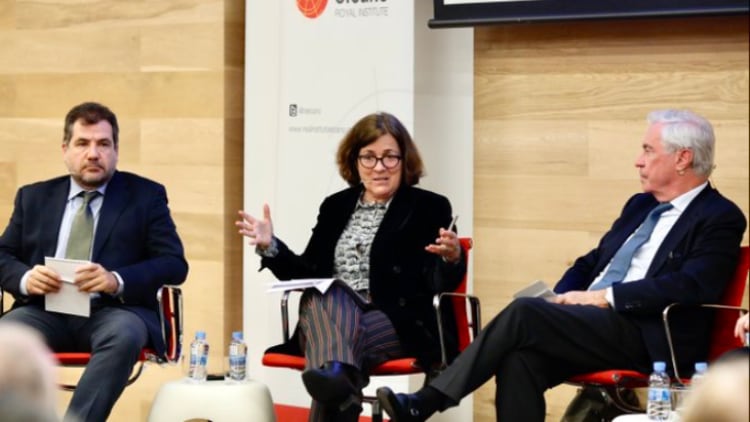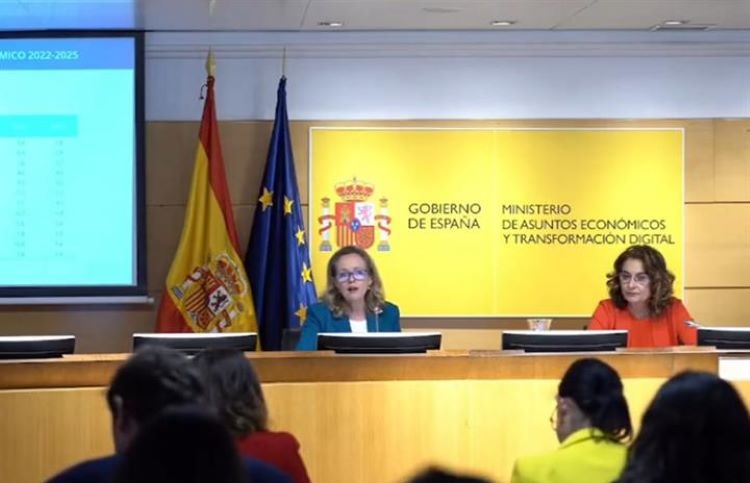Marta Martínez
The growing Euroscepticism on the French left was one of the issues highlighted in a debate organised by the Elcano Royal Institute to analyse the result of the French election, which gave victory to Emmanuel Macron, and its repercussions in Europe.
In the debate, held last Thursday and moderated by the director of Elcano, Charles Powell, the Madrid correspondent of Les Echos, Cécile Thibaud, pointed out that “If anyone believes that the French elections have solved anything…, nothing is done”.
Carmela Rios, former correspondent and columnist for El País, explained that Macron’s victory was largely due to the fact that the French president has understood the codes of social networks and their importance for these elections, and pointed out that Macron has great support from France’s urban youth, whose use of social networks has contributed enormously to his victory.
The power of social media, according to Carmela Ríos, was also used by Éric Zemmour, who launched a series of disinformative elements during the elections. The journalist ruled that the digital part and the candidates’ success in detecting these political communication levers indicate the importance of social networks for the future of democracies.
The idea that France is very polarised was very present in the analysis made by all the participants in the debate. Thus, Cécile Thibaud stated that Macron has “smashed” the traditional parties of right and left, leaving the two extremes of Le Pen (right) and Mélénchon (left).
The risk of Macron’s victory, she said, is that it will lead to a new disappointment of the electorate, because the country is fractured and polarised, and Macron needs the so-called “third round” (the legislative elections) to swing in his favour. According to Thibaud, negotiations are underway among the left-wing parties to secure victory in parliament.
He warned that Euroscepticism prevails among the left-wing parties and that there is talk of an exit from the European Union because social democracy no longer provides an answer and because a wilder liberalism has won. Thibau believes that a “mini Brexit” is being attempted from within.
Ignacio Molina, senior researcher at the Elcano Royal Institute, agreed on this point, saying that the politicisation of the European debate in France is evident: Macron, in contrast to Mélénchon, offers a very strong idea of EU integration.
Molina added that perhaps France’s semi-presidential model has meant that the parties have not been strongly established. It is surprising,” he said, “how weak the parties in France are compared to the rest of the European countries. Molina stressed the importance of Macron changing this reality, rather than continuing with French personalist politics.
Likewise, the researcher insisted on focusing not so much on electoral percentages, but rather on the figure of Macron himself, on his development and on what he can achieve if he obtains a new electoral majority.
For her part, Raquel García, a researcher at the Elcano Royal Institute, analysing Macron’s victory from the point of view of the European Union, stated that the EU is good for Macron and vice versa, because it is precisely Macron’s pro-European perspective that differentiates him from other participants in the elections.
The fact that a president has won who wants to make his Europeanism a hallmark of his identity is a good thing, according to Raquel García, who added that there are several factors that could favour French leadership, including the fact that there are many European projects that bear the French stamp. Moreover, according to the latest polls, Europeans are in favour of French leadership due to the relative new “weakness” of Germany following the departure of Chancellor Merkel.







